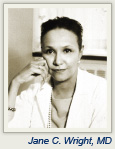 At the 2011 Annual Meeting, the Conquer Cancer Foundation renamed one of its annual awards to honor the legacy of one of ASCO’s groundbreaking founders. The Jane C. Wright, MD, Young Investigator Award (YIA) recognizes Dr. Wright’s leadership at ASCO, her contributions to the field of oncology, and her dedication and passion for finding a cure for cancer. The YIA is supported by the ASCO and Conquer Cancer Foundation Boards of Directors, and the first recipient was selected and honored during the Conquer Cancer Foundation Grants and Awards Luncheon at the Meeting.
At the 2011 Annual Meeting, the Conquer Cancer Foundation renamed one of its annual awards to honor the legacy of one of ASCO’s groundbreaking founders. The Jane C. Wright, MD, Young Investigator Award (YIA) recognizes Dr. Wright’s leadership at ASCO, her contributions to the field of oncology, and her dedication and passion for finding a cure for cancer. The YIA is supported by the ASCO and Conquer Cancer Foundation Boards of Directors, and the first recipient was selected and honored during the Conquer Cancer Foundation Grants and Awards Luncheon at the Meeting.
Though all of ASCO’s founders have immeasurably impacted the field of oncology, Dr. Wright’s story—as one of the few African-American female oncologists in the country at the time—is uniquely inspiring.
Breaking Barriers in Medicine
Dr. Jane Wright graduated with honors from New York Medical College, interned at Bellevue Hospital, and completed her residency at Harlem Hospital. She went to work with her father, Dr. Louis Tompkins Wright, who was Director of the Cancer Research Foundation at Harlem Hospital.
At Harlem Hospital, Dr. Jane Wright performed patient trials in chemotherapy, which was still mostly experimental. In 1949, the two began testing a new chemical on human leukemias and cancers of the lymphatic system. Several patients who participated in the trials had some degree of remission.
Following Dr. Louis Wright’s death in 1952, Dr. Jane Wright was appointed head of the Cancer Research Foundation at the age of 33. In 1955, Dr. Wright became an Associate Professor of Surgical Research at New York University and Director of Cancer Chemotherapy Research at New York University Medical Center and its affiliated Bellevue and University Hospitals.
During her career, Dr. Wright analyzed a wide range of anticancer agents, explored the relationship between patient and tissue culture response, and developed new techniques for administering cancer chemotherapy. In 1967, she was named Professor of Surgery, Head of the Cancer Chemotherapy Department, and Associate Dean at New York Medical College. At a time when African-American women physicians numbered only a few hundred in the entire United States, Dr. Wright was the highest-ranking African-American woman at a nationally recognized medical institution.
While pursuing private research at the New York Medical College, she implemented a new comprehensive program to study stroke, heart disease, and cancer, and created another program to instruct doctors in chemotherapy. In 1971, Dr. Jane Wright became the first woman President of the New York Cancer Society. She retired in 1987. During her 40-year career, Dr. Wright also published numerous papers on cancer chemotherapy and led delegations of cancer researchers to Africa, China, Eastern Europe, and the Soviet Union.
Dr. Wright’s Lasting Legacy: The Young Investigator Award
Since its creation in 1984, the Young Investigator Award has helped launch the careers of a number of promising investigators, many of whom have become leaders in the oncology community and their fields. YIAs are intended specifically for investigators at the beginning of their careers, during the transition from a fellowship program to a faculty appointment.
The first recipient of the Jane C. Wright, MD, YIA is Jung-min Lee, MD, a fellow at the NCI. Dr. Lee, with guidance from her mentor Elise C. Kohn, MD, plans to focus her research project on examining sequence-specific DNA damage with PARP inhibition and carboplatin in women’s cancers. She will investigate the best schedule for administering carboplatin with an experimental drug, olaparib, a PARP inhibitor.
PARP—polyADP ribose polymerase—is a protein that is involved in DNA damage repair. DNA repair is beneficial in normal cells, promoting healthy cell growth and proliferation. Studies have suggested that cancer cells may use the PARP enzyme-dependent DNA repair pathway to their growth and survival advantage. PARP inhibitors reduce DNA repair, leaving cancer cells susceptible to death. It is also suggested that cancer cells deficient in normal DNA repair, such as those in patients with germline BRCA1 or BRCA2 mutations, will be selectively susceptible to PARP inhibition.
For more information about Dr. Wright and the award, please view a short video “Paying Tribute to ASCO Founder Jane C. Wright, MD.” ■
© 2012. American Society of Clinical Oncology. All Rights Reserved.

